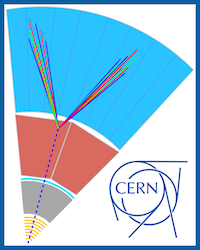Speaker
Description
Several new physics models predict the existence of neutral particles with macroscopic life-times known as dark photons. These particles, decaying outside of the interaction region, will give rise to striking signatures in the detectors at the LHC. These can be detected through numerous unconventional signatures: long time-of-flight, late calorimetric energy deposits, or displaced vertices.
A new approach to identify dark-photon late decays into ATLAS calorimeter system is offered by Deep Learning pattern recognition algorithms. A novel selection based on convolutional neural network (CNN) algorithms running on multi-dimensional jet cluster images is presented. The use of low-level input allows to fully exploit the ATLAS calorimeter information.
A L0 muon RPC trigger for HL-LHC based on CNN algorithms that will run on the new FPGA boards is also presented, designed to reconstruct displaced non-pointing tracks and displaced vertices already at L0.
